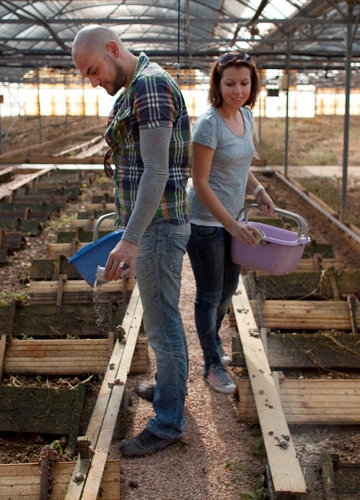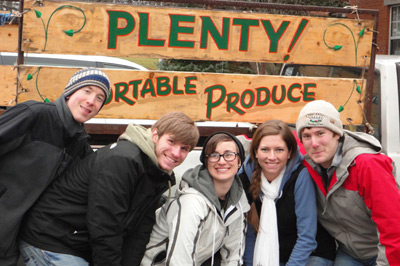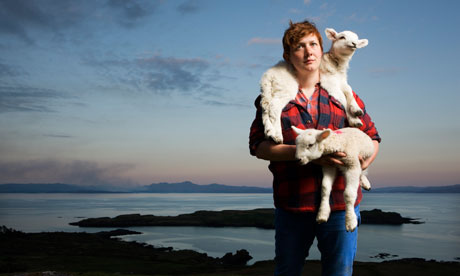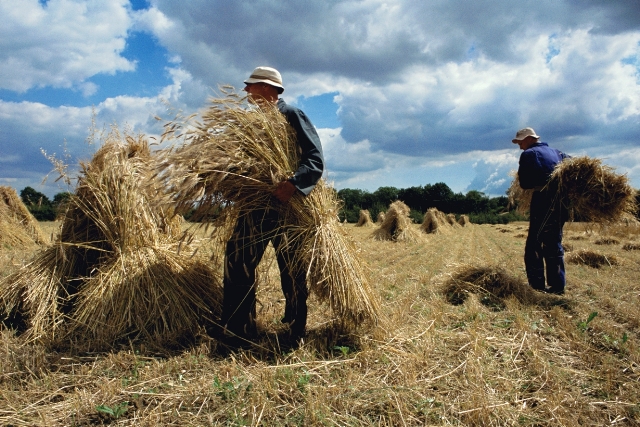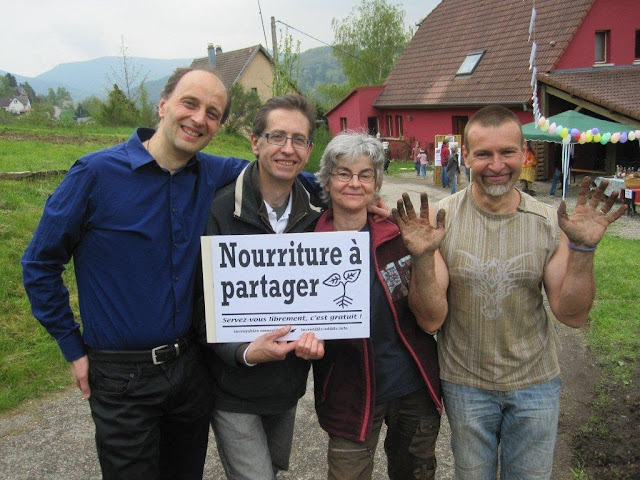Yet BBC World's show The Bottom Line just interviewed American investment pundit Jim Rogers, who predicts that is precisely what the future holds.
I don't know where they got their statistic, but it is an alarming one. This trend, though, points to the key for critical cultural transformation of developed economies in the coming decades. Rogers has seen young workers flooding into MBAs, marketing, PR, communications and tech over the past 30 years. But he argues: "You can't eat press releases."
Meanwhile, farmers are a dying breed: the average age of farmers is getting higher and higher in all the developed countries as farmers' children depart for cities to seek their fortunes. Rogers tells financiers to leave Wall Street and take up farming: "The stock brokers are going to be the ones driving taxis in the future, and the farmers are going to be the ones driving Lamborghinis." Rogers tells investors: buy farmland, and buy it now. AgWeb reports:
Rogers has been a fan of farmers and agricultural commodities for many years. "I am extremely optimistic about agriculture. First people thought I was nuts when I first started telling people to buy farmland, then they thought I was nuts, now they are trying to buy it too."
He believes that even though commodity prices have reached historic levels the past few years, they will continue going up, at least for a while.
"Even though demand has been going up for a long time, we are still consuming as much as we are producing," he says. "The 3 billion people in Asia have seen TV how we live in the U.S. and want to live that way now. Before this is over, prices of all agricultural products around the world will go higher."
Rogers, who was raised in Alabama, now lives in Singapore. He predicts Asian countries, such as China, will be the global economic leaders in the future.
He also believes they will hold the best investment options. "I don’t want to have many assets in the U.S. I am a U.S. citizen, but I think in the future there may be laws that keep you from taking money in or out of the U.S."Huge Money-Making Potential
Rogers says, if you are going to keep assets in the U.S., farmland is the best option. "Farmland is a great way to preserve your wealth and increase your wealth, if you can stay with it."
Even with farmland sales topping $20,000 per acre, he doesn’t believe the market is in a bubble. But, you won't see him at Midwestern land auctions dropping that kind of cash.
Instead, he says there are greater profits to be made buying land in other parts of the world, such as Paraguay, Africa and other developing nations. "Percentage gains will be higher in other countries than the U.S., he says.
Rogers says if the U.S. continues to have large debt issues, which is likely, agriculture will become more and important. "When a currency declines, the people who have real assets are the ones that make money. If the dollar collapses, one of the few ways you’ll be able to reserve you wealth, and even make money, is through productive farmland."An Aging Workforce
Rogers says the only reason he is nervous about agriculture’s outlook is that America’s farmers are growing older. Currently, the average age of U.S. farmers is 57, a number that has been steadily rising for two decades.
Even with technological advancements, Rogers is worried about the future. "Somebody has to be in the fields, even if it is a robot driving your tractor," he says. "Someone has to tell the tractor what to do. Unless we do something about getting manpower into agriculture, eventually we run out of food."
He encourages young people to consider a career in farming, if for no other reason, the money-making potential. "The stock brokers are going to be the ones driving taxis in the future, and the farmers are going to be the ones driving Lamborghinis."
Farming is big industry now - there are even tractors which drive themselves, sort of like Roomba vacuums, except much larger and remote-controlled via the farmer's computer. Contrast the anachronistic paradox of back-to-the-landers who use horses for cultivation 'because it's better than the environment.' These newcomers are naïve (farmers certainly see them as such), but these neo-traditionalists have a point about modern farming techniques becoming so industrialized that they are alien to the homely, hard work of earlier days. And it is homeliness, the search for the return to what really matters, which sees the value of farmland and agriculture rise, emotionally and economically in times of economic distress. Land is irreducible. And it isn't all for dreamers, since as Rogers indicated, demand for food will rise globally in the coming decades. Farming will be a viable economic undertaking and agricultural land will become increasingly valuable.
To return to the land is essentially a conservative movement, but a Millennial back to the land movement potentially will bring progressive maker movement solutions to farming: less Big Industry, genetic modification and heavy pesticides - more organic farming and cooperatives, supported by newly invented, high tech solutions. This will happen, that is, once farming's new arrivals get tired of ploughing their farms with horses.
Because of the Great Recession and growing demand for agricultural products, plus the inherent emptiness of the imploding materialist consumer culture, the great urbanization trend of the 19th century has begun to reverse itself, 21st century predictions of Super Megacities notwithstanding.
Over the past year, young Greeks, facing unemployment rates of well over 50 per cent (currently, it's 57 per cent), have returned to the land and agriculture in order to survive the recession. Some of them are creating communes, organized through the Internet and social media. The Orthodox Church owns about 40 per cent of agricultural land in the country and is allowing anyone who wants to farm Church lots to do so.
Millennials in America are looking back to the 1990s, when Gen X graduated into a recession. That era saw Gen X move into high tech as the economy recovered. But there were books published at that time, such as, New Pioneers: The Back-to-the-Land Movement and the Search for a Sustainable Future by Jeffery Carl Jacob (1998) which hinted at alternatives. Perhaps it is starting to become evident to Generations X and Y alike that recovery, when it comes, will not be the long golden age of post-war prosperity that the Boomers enjoyed in their youths. Rather, it will be a brief respite before another recession. More crashes are constantly predicted over the coming decades (see here, here, here, here, here, here, here and here (thanks to -H.)). When that realization dawns, who wants a PR job? You want fundamentals. The world will never be the same. But you can go home again.
In Canada and the US, urban farming is very popular, as are Millennial homesteading, hobby farming and backyard farming. A lot of people blog about their experiences with a so-called post-consumer lifestyle. There are shops with supplies and Websites with advice on how to stay off the grid. The Mother Earth News runs an annual list of Star Modern Homesteaders. You can see the 2013 nominees here.
There is a problem for the back to the land movement: the next generation cannot afford to buy out retiring farmers. In British Columbia's idyllic Fraser Valley, a small area that is intensively cultivated and brings in half of BC's produce, land which cost $40,000 to $60,000 per acre only a couple of years ago has now surpassed that figure. Thanks to the value of blueberry crops planted there, land prices are rising:
In the Fraser Valley, land that would have sold for $25,000 per acre five years ago is now going for $50,000 to $80,000 an acre, even up to $100,000 an acre or more with high-return blueberry crops already planted.
“If you’re looking at (buying) a 100-acre farm, which is not a big farm, you’re looking at $1 million to $2 million — as a starting point,” says David Sparling who heads the Agricultural Innovation program at Ivey business school at Western and who co-authored a recent report on farm investment in Canada. “That’s something new in agriculture.” ... “The fact is, you go to a coffee shop — and I know this joke is circulating — and at the coffee shop you can look at some ordinary guys and say, ‘there sits a table full of millionaires.’”
In Britain, people are dumping increasingly insecure white collar jobs to return to agriculture. There is a Campaign for Real Farming that announces its aims in eight steps. The Campaign begins by calling an entire generation back to the land. Agriculture is in total disarray, and everything needs rebuilding and streamlining. The Telegraph, unsurprisingly, jumped on the bandwagon already back in 2010, and insisted, It's Time to Get Back to the Land. The Land, a magazine about land rights, asked Can Britain Feed Itself? in 2007. At that time, its proposal excited little interest. Now, post-recession, it has revived its plan for British farming self-sufficiency or near-self-sufficiency and the interest is there.
In France, communal gardens have become very popular and are supported through social networking. From the Anna Lindh Foundation:
In the Loire valley, Pierre-Yves Fromonot and his wife and his wife offer internships on how to return to organic farming. You can see a report on their business here. There is also renewed interest in, and respect for, some old French agricultural techniques, as evident in this 2012 story about a Californian chicken farmer who traveled to northern France to learn how to better care for his poultry and to bring back healthier, non-genetically modified breeds.Called Incroyables Comestibles, the French version of the Incredible Edible movement, which began in the UK in 2008, involves planting collective vegetable gardens in easily accessible public spaces, such as school yards and in front of police stations, from which each can pick for free, according to his or her own need. In France, this movement began in the spring of 2012, and has spread to the four corners of the Republic, thanks in part to social media.



